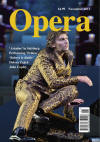|
|
|
|
|
|
|
|
|
Opera, November 2012 |
| Hugh Canning |
|
|
|
Strauss: Ariadne auf Naxos, Salzburger Festspiele, 29. Juli 2012 |
|
|
Austria Salzburg
|
|
|
 Alexander Pereira’s determination to make each of the six Salzburg festivals
he has (so far) planned unrepeatable one-offs is laudable, and his
experience of staging 14 new productions a year (including ballets) in
Zurich suggests that he is uniquely placed to pull it off. His decision to
mount the original 1912 version of Strauss and Hofmannsthal’s Ariadne auf
Naxos—or at least something like it—was an important marker for what a
Pereira Salzburg may prove to be. Strauss and Hofmannsthal, with the theatre
director Max Reinhardt, the opera’s dedicatee, were founding fathers of the
festival, which has only ever staged the familiar, revised version of 1916. Alexander Pereira’s determination to make each of the six Salzburg festivals
he has (so far) planned unrepeatable one-offs is laudable, and his
experience of staging 14 new productions a year (including ballets) in
Zurich suggests that he is uniquely placed to pull it off. His decision to
mount the original 1912 version of Strauss and Hofmannsthal’s Ariadne auf
Naxos—or at least something like it—was an important marker for what a
Pereira Salzburg may prove to be. Strauss and Hofmannsthal, with the theatre
director Max Reinhardt, the opera’s dedicatee, were founding fathers of the
festival, which has only ever staged the familiar, revised version of 1916.
Pereira’s newly-appointed director of spoken theatre in Salzburg,
Sven-Eric Bechtolf, was not only responsible for the staging in the hauS Für
MoZart (July 29), but also wrote the ‘Fassung für die Salzburger Festspiele
2012’—essentially a new play in which elements of Hofmannsthal’s adaptation
of Molière’s Le bourgeois Gentilhomme (Der Bürger als Edelmann) and of his
later text for the 1916 prologue were incorporated into a theatrical
representation of the author’s platonic flirtation with the rich Viennese
widow, Ottonie Gräfin von Degenfeld-Schonburg, whose grief was the
inspiration for the character of the abandoned Ariadne.
Lasting
around 75 minutes, Bechtolf’s play does an Intermezzo on Strauss’s
collaborator—something of which the poet-librettist would surely have
profoundly disapproved, as he did of Strauss’s autobiographical
comedy—showing the married Hofmannsthal (Michael Rotschopf) consoling his
bereaved friend (Regina Fritzch) and trying to distract her by involving her
in his rehearsals of the Molière play, in which they play the youthful
lovers to the Monsieur Jourdain of Cornelius Obonya (all three are
well-known actors in Austria). Late in the play, Bechtolf introduces
characters from the familiar Ariadne II prologue: the Major-domo (Peter
Matić, who played the role in Dieter Dorn’s Salzburg production from
1979-82); and the Composer (Thomas Frank), who spoke his little scene with
Zerbinetta (Elena Mosuc), while she sang her familiar notes, unaccompanied.
Although Bechtolf’s part 1 was far from the authors’ Conception, we got most
of Strauss’s enchanting incidental music and dances (choreographed by
Pereira’s Zurich ballet director, Heinz Spoerli), including a
lavishly-costumed sequence (Marianne Glittenberg) in which characters from
other Strauss operas, notably Salome, Elektra and Der Rosenkavalier, paraded
around the stage. In Rolf Glittenberg’s stylish, adaptable set, the entire
show looked ravishing and it was done with ideal taste and refinement. At
half time a triumph seemed assured.
Bechtolf’s staging of the
opera—which in this version includes music that Strauss later wisely cut,
including lashings of extra tagliatelle for Zerbinetta—was more
conventional, and Glittenburg’s decision to evoke Hofmannsthal’s ‘wüste
Insel’ with piled-up grand-piano carcasses resulted in something of an
obstacle course for the characters, and an unnecessarily cramped stage.
The only major surprise was the entrance of Jonas Kaufmann’s
Bacchus—the only one I have seen who fits Hofmannsthal’s description of
‘jung, zauberhaft, träumerisch’ (young, enchanting, dreamy)—in a
tight-fitting gold suit printed with leopard- and panther-skin motifs (see
this month’s cover). After his Troyens cancellation in london, his dark,
burnished Italianate tenor rang out magnificently in the exalted closing
pages after a slightly throaty start. This was the only sensational piece of
casting—and one wonders how often Kaufmann will want to sing it
elsewhere—but it made the visit worthwhile. The rest of the cast
was more Zurich on a decent night than premier cru Salzburg: Emily Magee,
rough-voiced as Ariadne; Mosuc, accurate but a bit coarse as Zerbinetta;
Gabriel Bermudez, woefully undercast for such a prestige event, as Harlekin.
In the pit, Daniel Harding—replacing a convalescing Riccardo Chailly—had the
luxury of the Vienna philharmonic, always a pleasure to hear in Strauss,
even though the British conductor doesn’t really make this music glow as a
great Straussian such as Böhm or Thielemann would.
|
|
|
|
|
|
|
|
|
|
|
|
|
|
|
|
|
|
|
|
|